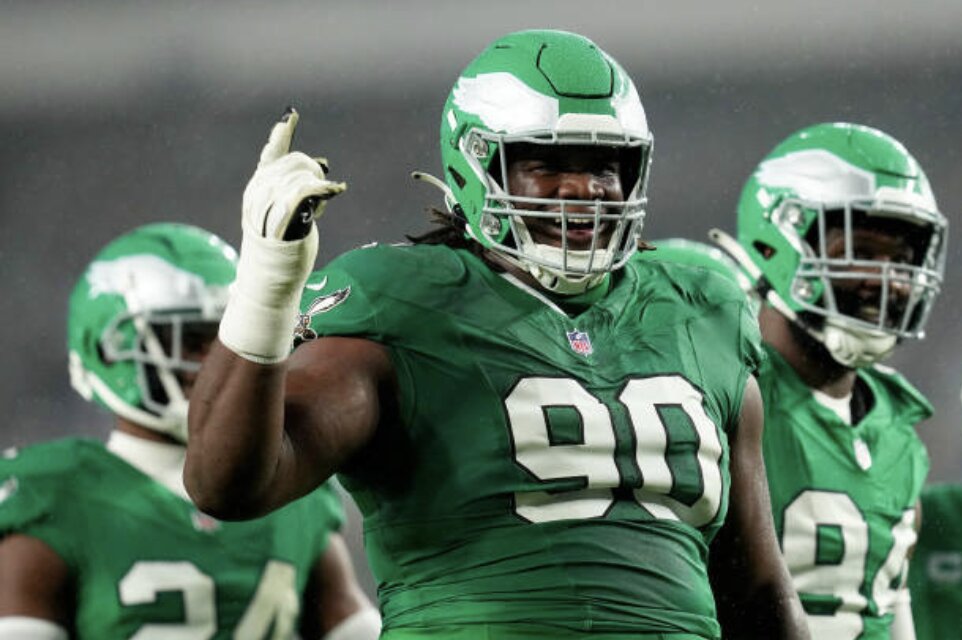The Points After: Curious Analytics Didn’t Equate To Loss

Doug Pederson’s aggression wasn’t the Eagles’ issue vs. Ravens.
The popular criticism after another close-but-no-cigar loss by the Eagles to a team clearly better than the Eagles was to laser-focus on coach Doug Pederson’s decision to eschew a point-after attempt on the team’s first touchdown and go for two instead.
Critics, myself included in the game’s immediate aftermath, ripped Pederson’s decision to chase points with plenty of time still remaining even while the Eagles trailed by double figures, especially after the conversion failed.
But the reality is Pederson’s post-touchdown hunches were far from the reason the Eagles dropped a 30-28 point loss to the Ravens at the Linc, especially when compared to another dropped bomb by John Hightower, a touchdown that bounced off Miles Sanders’ hands, and a brilliant Winston Justice disguise worn by right guard Jamon Brown in his Eagles debut.
Oh, and lest we forget Pederson’s much more egregious moment – having his fountain of nifty two-point conversion plays run dry by the time his offense needed one most, after the game’s final touchdown with the Eagles needing two more points to complete their comeback from down 16.
Despite the outcry, a failed two-point conversion in the third quarter was nowhere near the main culprit of Sunday’s loss.
In fact, the damage done by the stuffed run was already rendered moot by the fourth, after J.J. Arcega-Whiteside’s 2-point conversion catch from Carson Wentz marked the team’s second successful two-point conversion and 22nd point.
The Eagles scored four total touchdowns Sunday and tallied 28 points, which is the same number of points they would have scored if Pederson had taken the more conventional route and put Jake Elliott on the field for point-after kicks.
Over their last three games, the Eagles have converted 50 percent of two-point conversion attempts, a clip that ensures they won’t leave points on the board if they’re converting half their two-point attempts.
The issue with Pederson isn’t why he decides to dial up two-point conversions more than when. If there’s a formulaic method to his madness, it’s an unclear and inconsistent one.
There seems to be no common, scientific, data-based rationale to explain why he went for two after the Eagles scored the game’s first touchdown Week 4 against the 49ers but didn’t when the Eagles scored a game-tying touchdown in the first quarter two weeks ago against the Steelers.
Those specific decisions appeared to be rooted in gut instinct and feel as opposed to the ones made based on time remaining and deficit, and that’s potentially problematic.
The whole point of incorporating analytics in game-day decision-making is to use mathematical percentages gleaned from historical data to decide the likeliest outcome of any given play call, or essentially to eliminate the reliance on guesswork in favor of a “cheat sheet” that already has the answers.
Marrying data-based decisions with hunches is a potentially dangerous cat-and-mouse game, as the very nature of the former is to render the latter obsolete.
No sports organization flaunts it reliance on analytics more than the Tampa Bay Rays, whose manager, Kevin Cash, has asserted that all of his in-game decisions are predetermined and the byproduct of research and data.
“I try not to use gut feel. If we’re using gut feel, we’re not prepared as a staff.”
— TB MGR Kevin Cash on @MLBNetworkRadio just now. That’s a fun quote.
— Mike Petriello (@mike_petriello) August 16, 2019
Call him a robot, lament his lack of “feel for the moment,” castigate him and the Rays for a nauseatingly progressive approach that’s ruining your pastime.
An approach this calculated is a difficult pill to digest in a blue-collar, bottom-line football town that would appreciate its football Sundays being devoid of algebra and calculus.
But Cash is four wins away from managing Major League Baseball’s lowest payroll to a Word Series title. Just getting this far is testament to the franchise’s strict adherence to a meticulously researched, carefully crafted blueprint.
If the Eagles, who make no secret about their affinity for analytics, truly trust their process, Pederson’s decisions shouldn’t be a marriage of gut instinct and predicted outcomes. Being consistently inconsistent isn’t a strategy.
Suggesting that Pederson’s aggression cost them against the Ravens, though, is overlooking the actual breakdowns. Those were much worse.
– Geoff Mosher (@geoffmoshernfl) is co-host of the “Inside the Birds” podcast and staff writer for InsideTheBirds.com.
Listen to the latest “Inside the Birds” podcast with Geoff Mosher and Adam Caplan here:






Comments are closed here.